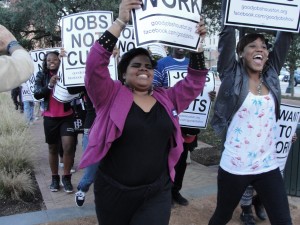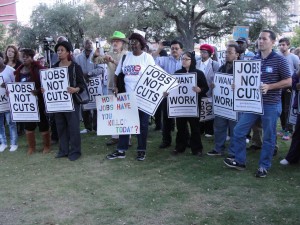by Gus Hall, Former National Chair
Communist Party USA
via http://epa.cpusa.org/bill_of_rights.htm
We Communists believe that socialism is the very best replacement for a capitalist system that has served its purpose but no longer meets the needs and requirements of the great majority of our people.
We believe that Socialism USA will be built according to the traditions, history, culture and conditions of the United States. Thus, it will be different than any other socialist society in the world. It will be uniquely American.
What will be the goals of our socialist society?
A life free of exploitation, insecurity, deprivation; an end to unemployment, hunger and homelessness.
An end to racism, national oppression, anti-Semitism; of all forms of discrimination, prejudice and bigotry. An end to the unequal status of women.
Renewal and extension of democracy; an end to the rule of corporate America and the private ownership of the wealth of our nation. Creation of a truly humane and rationally-planned society that will stimulate the fullest flowering of the personality, creativity and talent of the individual.
The advocates and ideologues of capitalism hold that such goals are utopian; that human beings are inherently greedy and selfish. Others argue that these goals can be fully realized under capitalism.
We are confident, however, that such goals can be realized – but only in a socialist society.
Why socialism?
Since its inception capitalism has been fatally flawed. Its inherent laws – to maximize profit on the backs of the working class – gives rise to the class struggle.
History is a continuous story of people rising up against those who exploit and oppress them to demand what is theirs. Our country’s historic beginning was revolutionary. The ideals of justice and equality have inspired people for centuries.
Up until the time of Karl Marx, those who advocated socialism were “utopians,” that is, motivated by ideals only. It was Marx and his friend and collaborator, Frederick Engels, who uncovered the inner laws of capitalism – where profit comes from and how societies develop. Marx and Engels transformed wishful thinking for socialism into socialism with a scientific, materialist basis.
Communists say that capitalism won’t be around forever, just like previous societies weren’t around forever either. Slavery gave rise to feudalism and feudalism to capitalism. So, too, capitalism gives rise to socialism.
In a socialist USA political power would be in the hands of working people. Socialism starts with nationalization of the main means of production – the mines, factories, agribusiness farms and everything necessary to produce what society needs. The large monopoly corporations and banks would come under public ownership – that is, under the collective ownership of the entire working class and people, who have the leading role in building socialism.
Socialism also means public ownership of the energy industry and all the natural resources. It eliminates forever the power of the capitalist class to exploit and oppress the exploited majority.
A socialist government draws up plans covering the entire economy. They are drawn up with maximum participation of the people, from the shop level on up. Such plans harmonize the interests of all, because there are no conflicts arising from exploitation of workers and the dog-eat-dog competition of capitalism.
A socialist government is based on all-around democracy, starting with economic democracy. The more people participate in running their own economy, the more firmly people’s power is established, the more successful a socialist America will be.
Trade unions in a socialist USA will insure a fair balance between what workers produce and what they receive. They will have decisive power to enforce safety and health provisions, prevent speedup, guarantee good transportation, working conditions and plant facilities.
Public services – schools, hospitals, utilities, transit, hospitals, parks, roads – are crumbling under capitalism. Under socialism public services will be updated and vastly expanded. They will be broadened in their scope beyond anything dreamed of under capitalism.
The U.S. will become a vast construction site. Homes, schools, hospitals, places of recreation will be built to end shortages, replace substandard infrastructures and public facilities.
Full employment will be quickly achieved as production is expanded to satisfy the needs of people. Automation at the service of the working people will lead to both reduced hours of work and higher living standards. There will be no danger of overproduction since production will be planned and people’s incomes will increase in line with the rising output of consumer goods and services.
Poverty will be ended quickly, with the recovery of the vast resources now wasted in war production, advertising and the extravagant lifestyles of the filthy rich.
All education will be tuition-free. Every person will have access to medical and health care without charge. These rights will be realized as rapidly as facilities can be built and the personnel trained.
With capitalism gone, organized crime will also go, for it is the vicious profit system that corrupts people and breeds crime.
Some ask whether guaranteeing basic necessities, free education and health care will encourage people to avoid working, or doing one’s best. The principle of socialism is: From each according to his/her ability, to each according to his/her work.
Socialism provides incentives for working better, producing more and higher quality goods, acquiring advanced skill. It does not equalize wages. Wages vary according to occupation and efficiency, although everyone is guaranteed a livable wage.
Under capitalism, improvements in skill, organization and technology are rightly feared by workers because they threaten jobs. Under socialism, they offer the chance to make the job more interesting and rewarding, as well as to improve the living standard.
Socialism provides moral incentives because the fruits of labor benefit all. No person robs others of the fruits of their labor. When social goals are adopted by the majority, people will want to work for these goals. Work will be less a burden, more and more a creative activity, where everyone is his or her neighbor’s helper, instead of rival.
It is true socialism will nationalize or socialize all large-scale production, property and real estate. But socialism does not require abolition of all privately owned businesses. It does not require nationalization of those small businesses owned by people who work for themselves and do not hire others to make a profit. Personal property – private homes and automobiles – will remain just that, personal property.
In highly mechanized U.S. agriculture there will still be a place for the family farmer. But the farm family will be relieved of the pressure of trying to compete with agribusiness monopolies.
Socialism USA
There will be rapid elimination of racial and national oppression. Socialism will bring complete equality for all racially and nationally oppressed. There will be no compromise with racism, for there will no longer exist a capitalist class which profits from it. Racism, national oppression, anti-Semitism, sexism, anti-immigrant discrimination and all forms of prejudice and bigotry will be banned by law, with strict measures of enforcement.
Affirmative action will be greatly expanded immediately to begin to undo – to make up for – hundreds of years of the ravages of racism. Full equality will be one of the main priorities of the new society.
The only privileged sectors will be the children, our future, and seniors, who have earned the right to a healthy, carefree and secure retirement.
The children will reap all the benefits of socialist child care, free nurseries and schools with the very best facilities and teachers. Children will have wonderful recreational and sports facilities. They will have the option to choose whatever career they wish, and the free education and training to achieve it.
Socialism provides the economic foundation for effective democracy for the masses of people. To carry through the economic and social transformation requires political rule by the working class – a government of, by and for the working people.
Socialism USA will benefit from the experiences, the mistakes and successes of the countries who built and are building socialism. But mainly it will reflect the distinctive features of U.S. development and our specific environment.
Unique historical advantages, like the unequaled natural resources, fertile soil and perfect weather, coupled with the contributions of generations of working people, enabled U.S. capitalism to achieve higher productive levels and living standards than capitalism in other countries.
The development of socialism here will have some other distinct advantages:
A highly developed industrial base with a highly trained and educated work force.
Free from the threat of foreign intervention, Socialism USA will not have to divert human and economic resources to defend itself.
Socialism USA will avoid the terrible problems of extreme poverty, illiteracy, civil wars, wars of intervention and world wars that the Soviet Union had to deal with.
Socialism USA will extend democracy to its fullest, taking as its starting point the democratic traditions and institutions of the American people.
Path to socialism
We say that it may be possible in the U.S. to bring socialism through peaceful means. Perhaps through the ballot box. One thing is clear: there won’t be socialism in the U.S. until the majority of the American people want it.
I like to say that when workers enter the corporate boardrooms to take over and the ruling class says something like: “Okay, you’re right, we made a mess of things and now you should run it all.” Well, then there won’t be any trouble.
But if the ruling class says: “Forget it!” and calls out the army, the police and the National Guard, that is how revolutions become violent. It starts with the ruling class. Workers and their allies have to defend themselves to fight for what is rightfully theirs.
We believe and advocate a socialist society in our country that will guarantee all the liberties defined in the Bill of Rights, but have never beenfully realized. These include the right of people to express themselves fully and freely through organizations of their choice and competing candidates who respect and are guided by the concept of building socialism.
Indeed, the freedoms in the Bill of Rights will take on far greater meaning for the great majority, who will then own the meeting halls, press, radio and TV, and will be able to exercise that freedom effectively.
That’s why we call ours “Bill of Rights Socialism USA.” Socialism is our vision for America’s future. It is a vision we are winning more and more people to because it is the logical – really a great – replacement for capitalism. And, because it is the next inevitable step up the ladder of human civilization.














